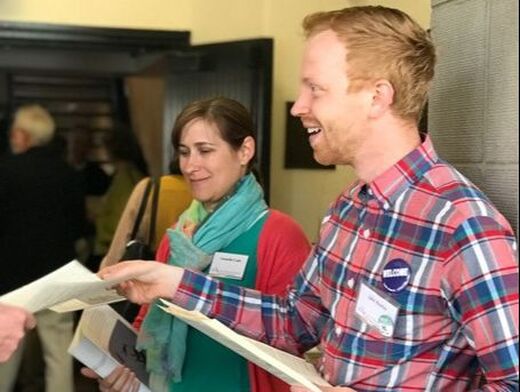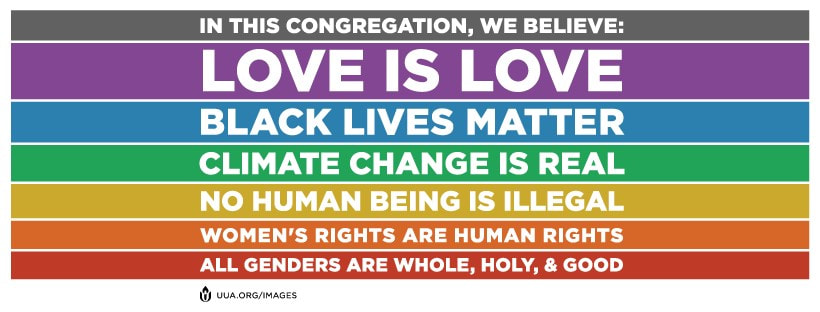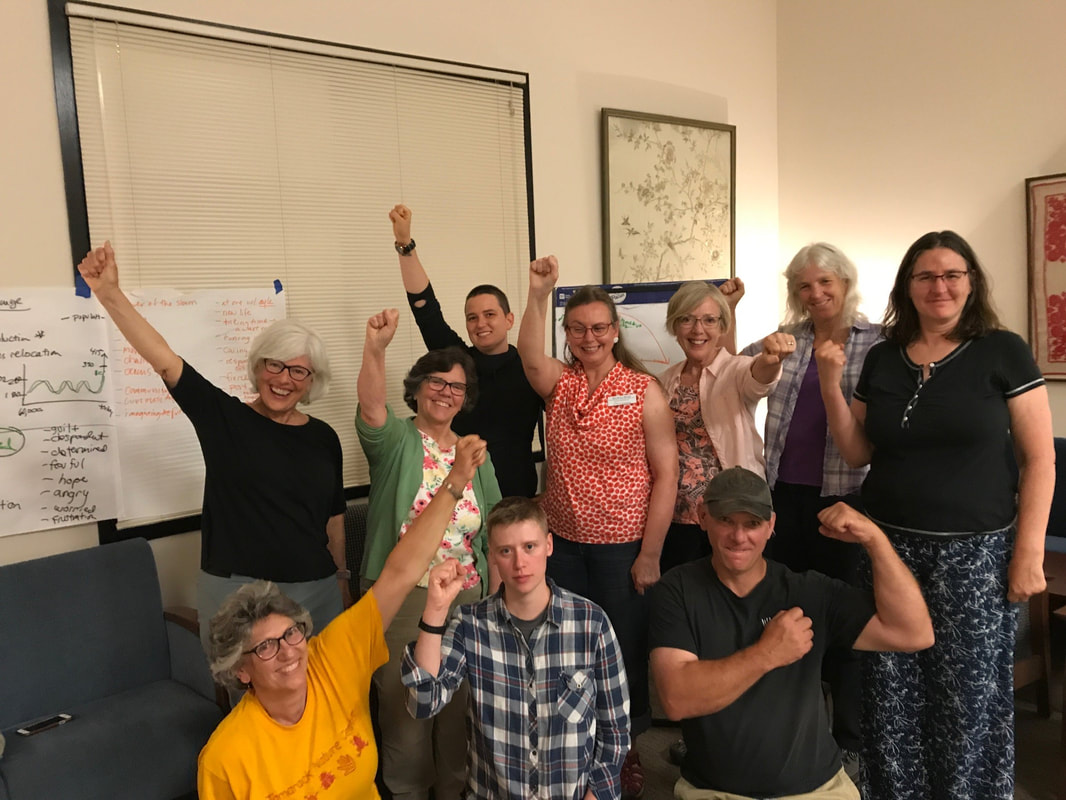|
Erika Sanders, Beloved Community Staff Team
As Unitarian Universalists, while we value freedom of individual belief, we covenant with one another to place justice at the center of our faith. That means grounding our justice work in theological, spiritual reflection. Engagement of Unity Church with the wider community happens, in large part, thanks to the work of nine dedicated Community Outreach Ministry Teams. In 2021, ministry teams began a structured process of renewal (see the April commUNITY newsletter) that includes a new model of grounding justice work in spiritual reflection. The two teams I spoke with that engaged with that model, the Double Helix Model of Faith Formation and Antiracist Multicultural Work, provided invaluable feedback, had good conversations, but experienced varying levels of success. With new opportunities to work with the Double Helix coming up this fall, more doors to greater understanding and depth will open for everyone in the congregation. Nicole Lynskey of the Act for the Earth Team spoke with me about the benefits of working with the Double Helix. Erika: How did you experience the renewal process? Nicole: Although the Act for the Earth Team is decentralized with four different subteams, we made time in other meetings where most of us were together, such as team happy hours and a four-hour retreat in January, where about 25 team members were present. We found this curriculum to lead us to deep and meaningful conversation. Erika: Did you find that the renewal process changed your understanding of spirituality and faith formation in connection to the work your team does? Nicole: Talking about spirituality in relation to our work is embedded in the Act for the Earth Team. For many of us, working in nature is spiritual, and that shows in the way we meet and our relationships with each other. We sometimes sing as part of meetings, and our spirituality/justice subgroup is about to introduce rituals for our meetings. And talking about climate change can be so depressing that you need to have a spiritual grounding; otherwise, you just want to give up. We know there’s a spiritual component to being persistent, especially in a context where all forces seem aligned against our success. Erika: When you worked with the Double Helix Model, how did that feel? Did it shape how you see your work as a team, and the relationship between your faith formation and antiracism? Nicole: Since many on the Act for the Earth Team have taken the IDI, and are in accountability groups following our IDI experience, the Double Helix Model didn’t feel hard; it felt like another piece of the work that helps us stay focused. For some members of the team, perhaps there was a question: “why are we doing this now, when other things feel more urgent?” Other team members felt that the need to explore the connection between faith and antiracist multicultural work was more obvious. In the end, though, I think we all found it worthwhile. We’ve also partnered with organizations such as Honor the Earth, which is led by Indigenous people. We’ve tried to follow that leadership in respectful and authentic ways, and to immerse ourselves in organizing processes that may be unfamiliar to those of us embedded in predominantly white culture. That work will be a continuous process, and the Double Helix Model will influence that. Note that the Double Helix Model is not available just to teams, but to all of us engaged in justice and community work. Rev. KP Hong, who developed the model with Laura Park, acknowledged the challenge of antiracist multicultural faith formation work. He weighed in on some essential questions for teams and for all of us doing social justice work:
This is a complex, demanding, and long-haul process, which seems to be a hallmark of Unitarian Universalism. But as UUA President Susan Frederick-Gray reminded us, “We are resilient. We have everything we need. We are enough. Love will continue to guide us.”* Contact Drew Danielson to find out more about the IDI and to sign up to take it: drew@unityunitarian.org. *“From the UUA President: Listening to the Call of Love” by Susan Frederick-Gray. UUA, January 14, 2021.
0 Comments
Erika Sanders, Beloved Community Staff Team
Unity’s engagement with the wider community happens, in large part, thanks to the work of nine dedicated Community Outreach Ministry Teams. Each team has a distinct focus, such as environmental sustainability, racial justice, or affordable housing, and each team partners with one or more organizations in the community to engage in education and advocacy. At the beginning of 2021, our teams began a process of reflection and renewal. To learn more about this, I interviewed Rev. Shay Mackay, Coordinator of Community Outreach Ministries at Unity Church. ES: Tell me how and why the Community Outreach Ministry Teams renewal process began. SM: In the past, each team reapplied every two years to ensure that the team’s work remained relevant and connected to the congregation and its community partners. In this time of so much transition, as well as deepening antiracist multicultural work in the congregation, leaders decided to ask the teams to reapply and also to engage in a process of reflection. We hoped that the renewal process would expand the ways that team members experience and articulate how their activities connect to their spiritual growth. This renewal process began in early 2021, and I joined the effort in July 2021. We hope it will be completed by June of this year. ES: What types of reflection are part of the renewal process? SM: Each team engages in the process a little differently, based on their focus, but in general, they reflect on questions such as:
ES: What are the most joyous things that you’ve seen come out of the renewal process? SM: The process has generated a lot of wonderful dialogue within teams, and excitement for continuing to grow in this work. For instance, as a result of working with the Double Helix Model, most team members have taken the Intercultural Development Inventory and are working on their individual Intercultural Development Plans. Each team is looking more closely at its relations with community organizations. They’re asking important questions about how those partnerships are or are not mutually beneficial, what each member wants from the relationship, and what team members’ aspirations are for the partnerships. We all want these partnerships to be authentic relationships of mutuality, and to avoid anything that feels like “white saviorism.” We also believe that these reflections and partnerships will help teams grow in their understanding of whiteness, of their own cultural framework. By interrogating our work we can transform how we engage with others, and it takes our understanding of how we are accountable to ourselves and to others in a much more nuanced, sophisticated direction. Ultimately, I think that this process is making Unity’s Ends more real and present in our day-to-day work. Being able to articulate who we are and why we do what we do is very powerful. Watch for Part II of “Renewal and Commitment,” about how one team has been transformed by this process. Mary Pickard, Welcome Team member Being respected and being treated well are not the same as having a feeling of belonging. -- Barb Cederberg  The Welcome Team — otherwise known as greeters or ushers — is reinventing itself at Unity Church. It might not seem obvious. We still hand out orders of service, pass collection plates, and clean up the pews after service. The transformation is happening in our hearts and we hope you will notice in your heart. The shift is rooted in the church’s desire to become more antiracist and multicultural, to create the Beloved Community, moving the emphasis away from the tactical to the relational to fulfill the Welcome Team’s new mission, “Nurturing Mutual Belonging.” “Welcome Team work is a spiritual practice and part of our covenant to provide a continuum of care here at Unity,” says Madeline Summers, team coordinator. “Nurturing mutual belonging starts with us as individuals — our own sense of belonging, knowing who we are, what we’re passionate about, and how we might be perceived by others. Then, it extends to our practice among team members.” Each team now meets 30 minutes before the service to check in, sometimes with a reading or reflection, so members can be grounded and know each other more deeply. By nurturing belonging within each team, we can better nurture belonging beyond to congregants. More focus is being given to interacting with people, so Welcome Team members aren’t going to be found behind tables anymore. Rather, we are circulating in the Parish Hall engaging in conversation. That’s not always easy, says Welcome Team member Barb Cederberg, a self-proclaimed introvert. “We want to do things right. We may not do it right, so it inhibits us from trying. How do we have the courage to try and live with the discomfort? Unity Church members have so much generosity, if mistakes are made, we can overcome.” Barb is passionate about the work. “I can feel where I belong and I can feel where I don’t belong,” says Barb. “Being respected and being treated well are not the same as having a feeling of belonging. I worked in corporate America for many years. I did not acknowledge my spouse, Judy, or that we had children. Nurturing belonging is a feeling of acceptance of self and others. At Unity, I can be myself. How do I encourage others to be themselves?” “Mutual belonging is more complicated than passing the collection plate or picking up Kleenex boxes,” says Jim Oberly, another Welcome Team member. “I’m an old white guy. I’m conscious of that. You know the images of deacons in the old churches — conveying an air of authority as if to say, ‘your money is safe with us.’ I used to wear a coat and tie. I dress differently now — a sweater and slacks.” Continues Jim, “When people enter the church, we greeters are likely to make misinformed judgments based on how someone looks. We need to stay open and curious. I do my best to help visitors figure us out — what might be expected during a service, where things are located, how to get more information — and I try to share something of myself in hopes they will share something of themselves with me.” Nurturing mutual belonging isn’t just for visitors. “It is a good direction for all the groups we have at church,” says Barb. “We should increase our awareness of how the interactions are among us. If someone is standing alone in the Parish Hall, start up a conversation.” She recalls when she was standing in line to greet the ministers and the woman ahead of her looked very sad. “I asked her if she was OK. She had just lost her husband two years earlier – about the time I lost Judy – so we got talking and now we’re good friends.” Jim has seen the value of mutual belonging in other aspects of his church volunteer work. In recent months, he and his wife have been escorting elderly women to church on Sundays. “As so many people came up to greet and fuss over them, I saw the elders come alive! It made them so happy. How many friends and admirers they have!” I guess that’s proof that whether we’re on a Welcome Team or not, all congregants are part of nurturing mutual belonging. If you are interested in joining the Welcome Team, contact Madeline Summers. All church members, including Welcome Team members, are encouraged to take the Intercultural Development Inventory (IDI), a tool to help build our self-knowledge so we can develop our personal and congregational capacity for welcoming all. Further, as we move forward in the spirit of transformation, Welcome Teams will be engaging with the Double Helix Model of Faith Formation and Antiracist Multicultural Work to deepen our practice of welcome. |
Topics
All
Beloved Community ResourcesUnity Justice Database
Team Dynamics House of Intersectionality Anti-Racism Resources in the Unity Libraries Collection Creative Writers of Color in Unity Libraries The History of Race Relations and Unity Church, 1850-2005 Archives
May 2024
Beloved Community Staff TeamThe Beloved Community Staff Team (BCST) strengthens and coordinates Unity’s antiracism and multicultural work, and provides opportunities for congregants and the church to grow into greater intercultural competency. We help the congregation ground itself in the understanding of antiracism and multiculturalism as a core part of faith formation. We support Unity’s efforts to expand our collective capacity to imagine and build the Beloved Community. Here, we share the stories of this journey — the struggles, the questions, and the collaborations — both at Unity and in the wider world.
The current members of the Beloved Community Staff Team include Rev. Kathleen Rolenz, Rev. KP Hong, Rev. Lara Cowtan, Drew Danielson, Laura Park, Lia Rivamonte and Angela Wilcox. |

